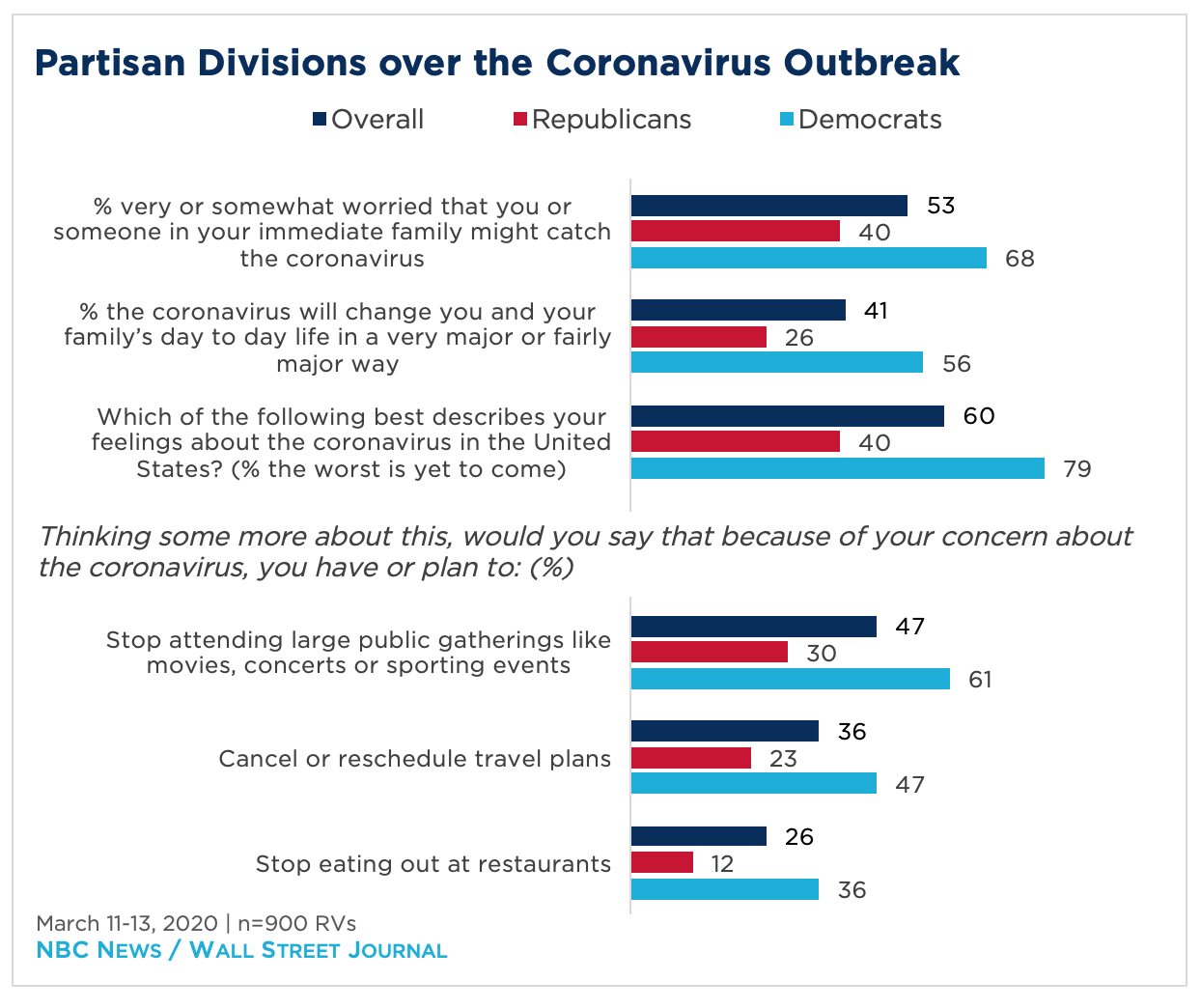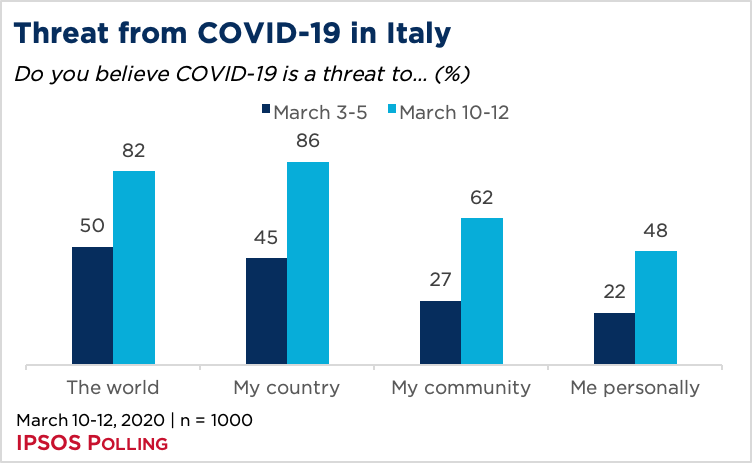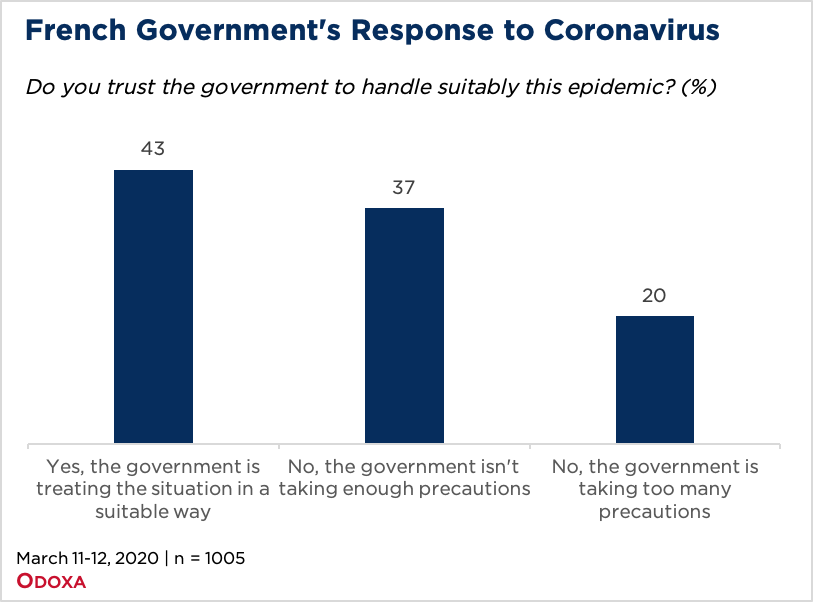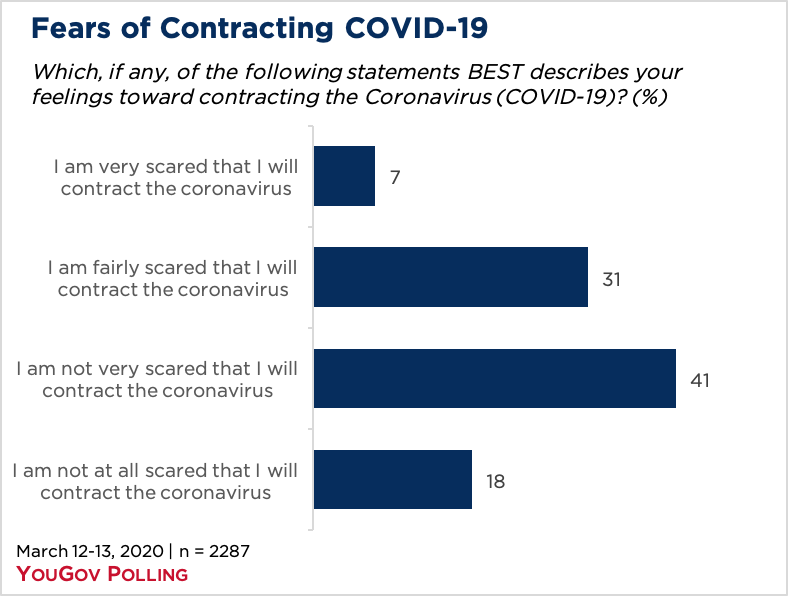Global Public Opinion on Continued COVID-19 Response

Council experts analyze global public opinion after the WHO officially declared the spread of COVID-19 a global pandemic.
Introduction
As the world grapples with the spread of the novel coronavirus (COVID-19), the Chicago Council Survey team will continue to provide weekly updates on how publics around the world are reacting. This week, we have updates on public opinion in the United States, Canada, South Korea, Japan, Italy, France, and the United Kingdom.
United States
The United States continues to grapple with the rapid spread of the novel coronavirus (COVID-19), with over 3,800 confirmed cases and at least 67 deaths thus far. An NBC News / Wall Street Journal poll conducted March 11-13 among registered voters found Americans intensely focused on the spread of the disease—but reacting along partisan lines.
Americans are highly focused on the spread of the disease; 89 percent say they’ve heard a lot about it. As NBC News notes in its writeup of the results, this is “the highest percentage the NBC News/WSJ poll has registered for a major event going back to 2009.” A majority of registered voters (53%) are very (15%) or somewhat (38%) worried that someone in their family might contract COVID-19, and six in ten (60%) say the worst is yet to come.
Americans are seeing COVID-19 affect their daily lives, with one-quarter (26%) saying the spread of the coronavirus has already changed their lives in a very or fairly major way. In a separate question, four in ten (41%) believe their day-to-day lives will change in a major way. A quarter of Americans have stopped attending large public gatherings, with 19 percent saying they have canceled or rescheduled travel plans, and 13 percent saying they have stopped eating at restaurants. Those numbers are likely to rise as states and cities across the country impose new restrictions on public gatherings and dine-in at restaurants and bars.
However, there are also clear partisan divisions in how Democrats and Republicans are reacting to the spread of COVID-19. Democratic voters are more likely to report being worried about an immediate family member contracting COVID-19 (68% vs 40% among Republicans). A majority of Democrats believe their day-to-day lives will change in a major way (56% vs. 26% of Republicans). And Democrats are far more likely to report having changed or planning to change their behavior in response to the outbreak.

Canada
On Monday, March 16, Canada announced it was closing its borders to anyone other than Canadian citizens, Canadian permanent residents, and US citizens. Prime Minister Trudeau is himself in isolation, following his wife’s positive COVID-19 test last week. And on March 18, the US and Canada announced they were closing their border to non-essential travel.
The situation has escalated rapidly, with 424 cases reported in Canada so far. Polling from the Angus Reid Institute conducted March 13-15 finds rapidly rising concern among Canadians. Two-thirds (68%) now say there is a serious threat of a coronavirus outbreak in Canada, up from 42 percent a week prior. Only a third (32%) continue to say that the threat of an outbreak in Canada has been overblown. The shift has also affected Canadians of all political stripes—majorities across the political spectrum believe there is a serious threat of an outbreak.
That concern is reflected in rising fears of local and personal impacts. A majority (57%) now say they are personally concerned about getting sick from the novel coronavirus, up from 40 percent last week. Three in four Canadians are concerned about friends or family becoming sick (76%, up from 53% last week), Concerns about people in their community getting sick have similarly risen over the past week (75%, up from 52%).
In response, Canadians are increasingly changing their behaviors. Eight in ten (82%) say they are washing their hands more. Nearly half (48%) report staying away from public spaces, up from just 17 percent who said the same last week. And the proportion of Canadians who report stocking up on food (34%) and medicine (18%) has doubled over the past week.
Canadians are also concerned about the economic impact: 86 percent are concerned the coronavirus will hurt the Canadian economy, up from 66 percent last week, and 65 percent are concerned about the impact on their personal financial situation, up from 44 percent last week.
However, Canadians remain relatively confident in their ability to deal with the outbreak. Half (53%) are confident that the healthcare system in their community is prepared to deal with new cases, and 58 percent say the federal government is doing a good job handling the outbreak, up from 49 percent last week.
South Korea
South Korea’s response to coronavirus has attracted a lot of attention in the United States for its ability to roll out testing on a massive scale. That testing—on the order of 20,000 people per day—has proven pivotal in the country’s ability to seemingly contain a wider outbreak. It has also been good politics.
President Moon’s approval rate has moved from 42 percent two weeks ago to 49 percent in the most recent poll from Gallup Korea. What’s more, 58 percent approve of the government’s response to coronavirus. That includes 22 percent of supporters of the opposition. That is noteworthy considering just 6 percent of those opposition party supporters approve of the president’s job performance.
The government’s move to widespread testing also appears to be paying dividends with regard to concerns among the public about contracting the coronavirus. Two weeks ago, 77 percent of the public was either very (46%) or somewhat (32%) concerned. That number has now declined to 70%, with a shift to lesser intensity of concern (39% very, 31% somewhat).
This trend is most obvious at the center of the outbreak in Daegu. Two weeks ago, 80 percent in Daegu said they were either very (62%) or somewhat (17%) concerned about contracting the virus. Concern is now at 71 percent with markedly lower intensity (46% very concerned and 26% somewhat concerned). These shifts generally reflect change across the country.
Japan
According to an Asahi Shimbun poll conducted March 14-15, the Japanese public is divided in their evaluations of the government’s response so far to the novel coronavirus: 41 percent evaluate the response positively and 41 percent evaluate it negatively. In a previous Asahi poll, conducted February 15-16, a majority of Japanese (51%) negatively viewed the government’s response.
However, on the specifics, the government response gets mixed reviews. Six in ten (60%) approve of Abe’s decision to shut all schools across the country, but nearly two-thirds (64%) say the timing of the government’s decision to close Japan to visitors from China and South Korea (a move that began on March 9) was inadequate. And two-thirds (67%) say the government’s efforts to address mask shortages has been insufficient.
Still, the public is taking things in stride. While sporting events have been widely canceled (including J-league soccer) or closed to the public (such as the Spring Grand Sumo Tournament in Osaka), eight in ten Japanese (78%) say these moves are appropriate. And while nearly half (46%) say they are worried that daily life will become difficult due to the spread of COVID-19, only a third (33%) say they are stressed about the spread of canceled events and self-imposed isolation.
One person certainly stressed about event cancelations: Prime Minister Abe, who continues to aim for an on-time Olympics this July. But a majority of Japanese think differently: 63 percent say the Tokyo Olympics should be postponed. Moreover, per a March 14-16 Kyodo News poll, 70 percent of Japanese do not think the Olympics will be held as scheduled.
Italy
After China, Italy has the second highest number of coronavirus cases in the world: so far, over 27,000 cases and over 2,000 deaths. Due the massive spike in cases, Italian Prime Minister Giuseppe Conte announced on Monday, March 9 that the borders of their nation would be locked down to prevent further spread of the virus. An unprecedented move in a democracy, the world watches to see if the Italian government’s drastic efforts will yield results.
In a survey of 1,000 Italian adults conducted from March 10 to 12 by Ipsos, responses show that Italians are much more threatened by COVID-19 than they were when asked a week ago; the proportion of Italians who view the coronavirus as a threat to the world has gone up to 82 percent (50% during March 3 to 5) and those who view it as a threat to Italy has shot up to 86 percent (45% last week). A minority view the virus as a threat to themselves personally (48%), though this percentage has nearly doubled in the last week (22%).

Regarding the international and domestic response in Italy, more Italians perceived that World Health Organization (73%), and the National Health Service (68%) as effective at controlling the spread of the virus than the national (56%) or regional (49%) governments. These results did not change more than 5 points from the week before, even after the imposition of a nationwide lockdown.
However, asked whether they felt more or less safe after the enforcement of new regulations, 61 percent of Italians said they feel more safe and 63 percent say they view these new measures as very much or very effective.
France
As cases in France continue to rise, the public has been mandated to stay in for the next 15 days under risk of penalty as French President Macron declared France was "in a war of health.” France continues to trail Italy and Spain in the number of infections and mortality rate, with over 5,000 positive cases and just over 100 deaths.
According to a survey of 1,005 French adults between March 11 and 12, 51 percent of French respondents are either very or somewhat worried for themselves and their family. However, this is only a 3-percentage point increase from an earlier survey wave in January. Asked about the government’s response to the epidemic, 43 percent said the government was taking suitable precautions while the rest of people said the government is taking either too few or too many precautions.

In addition, as French municipal elections approached, many French citizens and international observers wondered whether the polls would be conducted; President Macron decided not to postpone the elections and on Sunday March 15, the French went to the polls to elect their local politicians. Asked whether the government was right or wrong to push back the first round of municipal elections, 64 percent said the government was right to do so. Moreover, 61 percent
United Kingdom
The United Kingdom government, confronted by a surging number of infections and grave predictions, announced on Monday, March 16 that it was unveiling more comprehensive measures to mitigate and control the spread of the coronavirus. This change in policy followed widespread criticism that 10 Downing Street’s response was vague and lax compared to other nations facing similar outbreaks. In particular, Prime Minister Boris Johnson has announced strict quarantine measures and has ‘emphatically’ suggested that people avoid bars and restaurants, though he did not mandate that they close.
Polling conducted by YouGov from March 12 to 13 shows that many in the UK were less critical of the government’s response and less concerned generally; asked how the government was handling the coronavirus outbreak, 10 percent said very well and 45 percent said fairly well. Nonetheless, in terms of measures taken to protect themselves from the virus, 61 percent have said they are improving their personal hygiene, 30 percent are refraining from touching objects in public, and 24 percent are avoiding public spaces.
However, British people were asked directly about their feelings toward contracting the coronavirus and 59 percent said they were either not very or not at all scared.

For the latest information on the novel coronavirus COVID-19 from the US Centers for Disease Control and Prevention, please visit their website.





